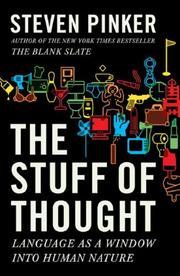Onomatopoeia, Sound Symbolism, and Phonesthesia
Onomatopoeia and sound symbolism are the seeds of a more pervasive phenomenon in language called phonesthesia, in which families of words share a teeny snatch of sound and a teeny shred of meaning. Many words with the sound sn-, for example, have something to do with the nose, presumably because you can almost feel your nose wrinkle when you pronounce it. They include words for the nose itself (like snout), words for noselike instruments (like snorkel and snoot, a cone for directing a spotlight), words for actions and things that are associated with the nose (like sneeze, sniff, sniffle, snivel, snore, snort, snot, snuff, and Snuffleupagus), and words for looking down your nose at someone (snarky, sneer, snicker, snide, snippy, snob, snook, snooty, snotty, and snub).
Less obvious is why the sn- sound should be associated with quick, furtive, or acquisitive acts, as in snack, snag, snap, snare, snatch, sneak, snip, snitch, snog, and snoop (or is that a word for sticking your nose into someone’s business?). Perhaps one can sniff a hint of quickness and softness in the pronunciation of sn-, but that seems a bit after-the-fact, and could apply to just about any English onset. It’s more likely that phonesthesia grows outward from a nucleus of similar words that have coalesced for any number of reasons. Some may be products of sound symbolism. Others may be fossils of a morphological rule that was active in an earlier period of the language, or in a language from which the words were borrowed. And some might arise by sheer chance, thrown together in phonological space because the sound pattern of a language allows only so many combinations of vowels and consonants. But once these words find themselves rubbing shoulders, they can attract or spawn new members owing to the associative nature of human memory, in which like attracts like. (In Words and Rules I showed how this feature of memory gave rise to families of similar irregular verbs like sing-sang, ring-rang, drink-drank, and wind-wound, find-found, grind-ground.) Here are a few other clusters; you can be the judge of how symbolic their sounds are:
cl- for a cohesive aggregate or a pair of surfaces in contact: clad, clam, clamp, clan, clap, clasp, clave, cleat, cleave, cleft, clench, clinch, cling, clip, clique, cloak, clod, clog, close, clot, cloven, club, clump, cluster, clutch
gl- for emission of light: glare, glass, glaze, gleam, glimmer, glimpse, glint, glisten, glitter, gloaming, gloss, glow
j- for sudden motion: jab, jag, jagged, jam, jangle, jarring, jerk, jibe, jig, jigger, jiggle, jimmy, jingle, jitter, jockey, jog, jostle, jot, jounce, judder, juggle, jumble, jump, jut
-le for aggregates of small objects, holes, or marks: bubble, crinkle, crumble, dabble, dapple, freckle, mottle, pebble, pimple, riddle, ripple, rubble, ruffle, spangle, speckle, sprinkle, stubble, wrinkle
Notes:
Folksonomies: onomatopoeia sound symbolism phonesthesia
Taxonomies:
/technology and computing/hardware/computer components/sound cards (0.577368)
/society/unrest and war (0.367754)
/science/medicine/surgery (0.205818)
Keywords:
sound symbolism (0.964664 (negative:-0.392814)), nose wrinkle (0.793919 (neutral:0.000000)), words (0.790291 (negative:-0.384019)), similar irregular verbs (0.774789 (neutral:0.000000)), sound sn (0.749445 (neutral:0.000000)), teeny snatch (0.734173 (negative:-0.659643)), sn- sound (0.727692 (negative:-0.364548)), Phonesthesia Onomatopoeia (0.723398 (negative:-0.392814)), teeny shred (0.718195 (negative:-0.659643)), similar words (0.687811 (neutral:0.000000)), pervasive phenomenon (0.681435 (negative:-0.392814)), noselike instruments (0.667843 (neutral:0.000000)), sound pattern (0.663669 (negative:-0.408229)), English onset (0.663598 (negative:-0.258565)), acquisitive acts (0.657357 (neutral:0.000000)), associative nature (0.656726 (neutral:0.000000)), phonological space (0.654938 (negative:-0.408229)), sheer chance (0.654235 (neutral:0.000000)), earlier period (0.653784 (neutral:0.000000)), new members (0.650977 (neutral:0.000000)), morphological rule (0.650977 (neutral:0.000000)), cohesive aggregate (0.649360 (negative:-0.400983)), human memory (0.649208 (neutral:0.000000)), sudden motion (0.648299 (negative:-0.509411)), small objects (0.645107 (negative:-0.263496)), language (0.604813 (negative:-0.344161)), families (0.554847 (negative:-0.659643)), sniff (0.554398 (negative:-0.488397)), snore (0.544121 (negative:-0.333208)), snoot (0.541943 (neutral:0.000000))
Entities:
Phonesthesia Onomatopoeia:Person (0.941358 (negative:-0.392814)), Snuffleupagus:City (0.671524 (neutral:0.000000)), snook:Person (0.659202 (neutral:0.000000))
Concepts:
Onomatopoeia (0.926528): dbpedia | freebase
Sound symbolism (0.882561): dbpedia | freebase | yago
Vowel (0.818971): dbpedia | freebase | opencyc
Rhinarium (0.806574): dbpedia | freebase
Sound (0.794982): dbpedia | freebase | opencyc
Japanese sound symbolism (0.743436): dbpedia | freebase | yago
Snout (0.659913): dbpedia | freebase
Language (0.656374): dbpedia | freebase | opencyc





